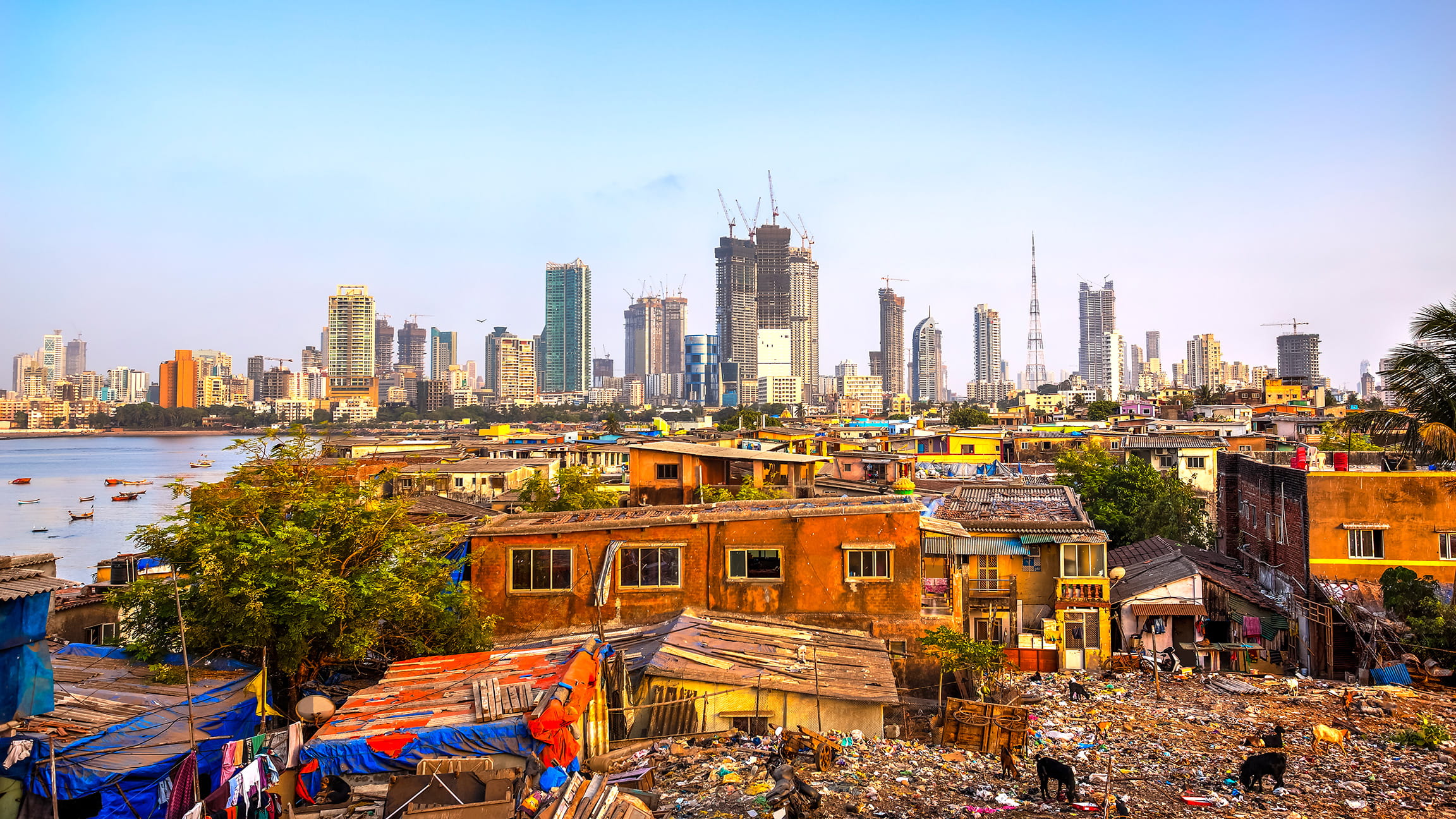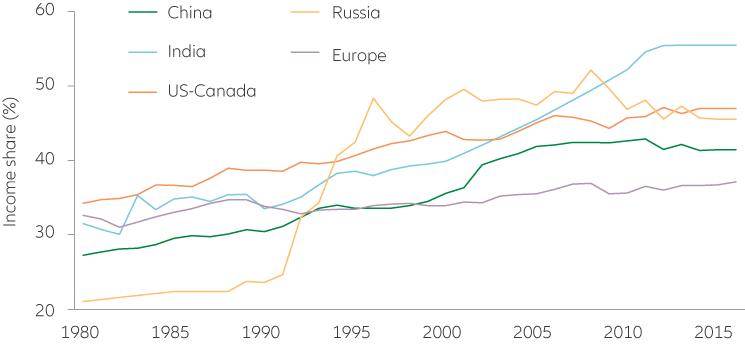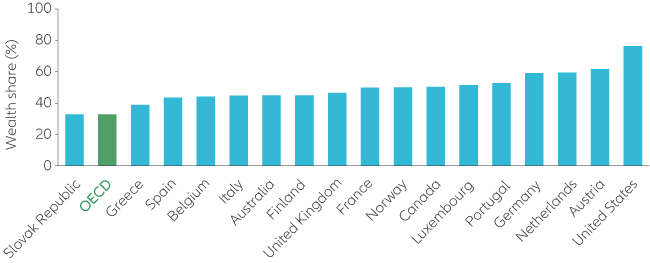
Summary
Wealth and income inequality are pressing global issues, affecting the quality of life for countless people, suppressing economic growth, stretching governments’ capabilities and destabilising social systems. The good news? Politicians, corporations and investors can all do their part to enact change.
Key takeaways
|
Even though extreme poverty has fallen in recent years, economic inequality has grown more pervasive. In addition to having a human cost, it drags down economic growth and destabilises social systems, and it stresses government spending and revenue streams.
Yet while there’s no easy fix, there are ways to narrow the inequality gap.
Policy makers can focus on social safety nets, taxation structures and educational systems; corporations can boost training, compensation and sustainability efforts; and investors can promote responsible corporate governance. And we must make this a high-priority global effort: inequality is one of the most pressing social and economic issues the world faces today.
How pervasive is economic inequality?While society has always had its share of haves and have nots, economic inequality – the uneven distribution of income and wealth – is arguably more widespread now than at any point since the Industrial Revolution.
According to the United Nations, the top 1% of the US population owned more than 38% of the country’s total wealth in 2016. But as the accompanying charts show, this is not just a US problem: economic inequality is rising worldwide, and the top 10% of populations are benefiting disproportionately.
Income inequality is rising almost everywhere
Income shares of the top 10% of populations (1980-2016)

Source: World Inequality Database, World Inequality Report 2018. Data as at 2016.
Wealth inequality is highest in the US
Wealth shares of the top 10% of populations (2010)

Source: OECD Wealth Distribution Database, Allianz Global Capital Markets & Thematic Research. Data as at 2010, except Chile (2011); Australia, Canada, UK (2012); Korea (2013).
In recent years, globalisation has given rise to global manufacturing, enabling goods to be produced in low-cost centres and increasing the affordability of consumer products, including high-tech goods. But this shift of activities to developing nations has hollowed out industries in developed countries, including traditional big employers such as mining and steel. The rise of robotics, automation and artificial intelligence will also threaten conventional jobs in the future. Together, these and other developments have reduced the traditional work opportunities that once supported large segments of the population. This has made income and wealth inequality worse and created a growing opportunity gap – particularly for the next generation.
Financial globalisation via the deregulation of financial markets has also played a role in making inequality worse by helping those who have wealth to increase it. Those who were able to invest in the financial markets since the 1980s have done extremely well – particularly in the last 10 years, thanks to central banks’ extremely accommodative monetary policy pushing up asset prices across the board. By contrast, the large number of people who don’t invest in risk assets have found themselves left increasingly farther behind. Enabling more people to participate in the “risk premium” of financial assets is clearly part of the solution.
While economic inequality may be rising, extreme poverty has dropped around the world. And it is fair to say that income inequality as a measurement tool doesn’t always paint a full picture: a struggling nation can suffer from crippling poverty while being low on the income-inequality scale.
In most countries, however, governments are paying close attention to economic inequality – just for different reasons:
- In the emerging world, where most wages are low, wealth inequality is the bigger issue. Not enough people own their own homes or have sufficient savings or pensions.
- In developed markets, a decreasing number of wealthy individuals shoulder more of the tax burden. Moreover, the social safety net is growing strained as ever-larger portions of the population are unable to afford basic living expenses, quality medical care and retirement savings – exacerbated by the rising, inflationary costs of health care.
Worldwide, economic inequality is a destabilising force: it creates distrust and undermines cohesion, increasing the appeal of factional politics. Moreover, in a world of ultimate openness – aided by social media – people today are more aware of what they are “missing” than were previous generations. This not only boosts populist politics, but it has a social cost: when people perceive they have fallen behind, they can be more stressed, grow less healthy and make riskier decisions as they try to catch up.
How to repair economic inequalityAt Allianz Global Investors, we believe that all societal stakeholders – citizens and governments, investors and corporations – can play a role in addressing rising inequality even as we ensure that poverty levels continue to fall.
- To raise the level of personal savings and investment, governments should expand policies that educate their citizens about financial markets and encourage investment.
- The financial industry can improve financial inclusion by promoting wider access to financial services in a sustainable, responsible way.
- Financial literacy must be enhanced to enable larger portions of the population – particularly younger generations – to raise their economic standing.
- Regulation and tax reform need to become more fair and less politicized – and central banks must be allowed to focus on the longer-term interests of their economies, free of short-term political considerations.
- More-progressive tax policies can redistribute wealth in helpful ways, since lower-paid workers spend a greater proportion of their earnings than their higher-paid counterparts.
- Governments must improve the social safety net, using ubiquitous new technologies to make it more efficient, less prone to abuse and better at revenue collection.
- Education systems should be modernised to boost workers’ skill sets, and student-loan systems may need to be overhauled, particularly if they reprice education in a way that benefits the supplier, not the student.
- Workforces need training, investment and support, and management teams should move into a more cooperative approach towards managing and retaining employees. Successful companies tend to pay more than less successful ones; better people and better remuneration deliver better productivity.
- With lower taxation and smarter regulation, financial services companies and banks should be able to reduce and better align their fees. This may help address accusations of profiteering.
- Investors can pressure management teams and boards to focus on environmental, social and governance (ESG) factors – particularly executive pay – that can help reduce inequality.
At Allianz Global Investors, we constantly work towards applying the power of active management to real-world issues – from the challenges and opportunities presented by robotics and artificial intelligence, to the perils of low productivity and rising economic inequality, to the ESG factors that help companies and shareholders succeed. As such, we will continue to strive to add value beyond pure economic gain by aligning our interests with those of our clients and our communities – directing capital into initiatives that are likely to promote future growth in a more sustainable and equitable way.
Investing involves risk. The value of an investment and the income from it will fluctuate and investors may not get back the principal invested. Past performance is not indicative of future performance. This is a marketing communication. It is for informational purposes only. This document does not constitute investment advice or a recommendation to buy, sell or hold any security and shall not be deemed an offer to sell or a solicitation of an offer to buy any security. The views and opinions expressed herein, which are subject to change without notice, are those of the issuer or its affiliated companies at the time of publication. Certain data used are derived from various sources believed to be reliable, but the accuracy or completeness of the date is not guaranteed an no liability is assumed for any direct or consequential losses arising from their use. The duplication, publication, extraction or transmission of the contents, irrespective of the form, is not permitted. This material has not been reviewed by any regulatory authorities. In mainland China, it is used only as supporting material to the offshore investment products offered by commercial banks under the Qualified Domestic Institutional Investors scheme pursuant to applicable rules and regulations. This document is being distributed by the following Allianz Global Investors companies: Allianz Global Investors U.S. LLC, an investment adviser registered with the U.S. Securities and Exchange Commission; Allianz Global Investors GmbH, an investment company in Germany, authorized by the German Bundesanstalt für Finanzdienstleistungsaufsicht (BaFin); Allianz Global Investors Asia Pacific Ltd., licensed by the Hong Kong Securities and Futures Commission; Allianz Global Investors Singapore Ltd., regulated by the Monetary Authority of Singapore [Company Registration No. 199907169Z; Allianz Global Investors Japan Co., Ltd., registered in Japan as a Financial Instruments Business Operator [Registered No. The Director of Kanto Local Finance Bureau (Financial Instruments Business Operator), No. 424, Member of Japan Investment Advisers Association and Investment Trust Association, Japan]; and Allianz Global Investors Taiwan Ltd., licensed by Financial Supervisory Commission in Taiwan.
536396
About the author


Summary
Thanks to central banks’ coordinated efforts, the global economy has not only recovered from the financial crisis, but enjoyed a good run of solid growth and low inflation. Take a closer look at this “Goldilocks moment” for insights into the cast of characters at play – and the surprises that may be in store.
Key takeaways
|






